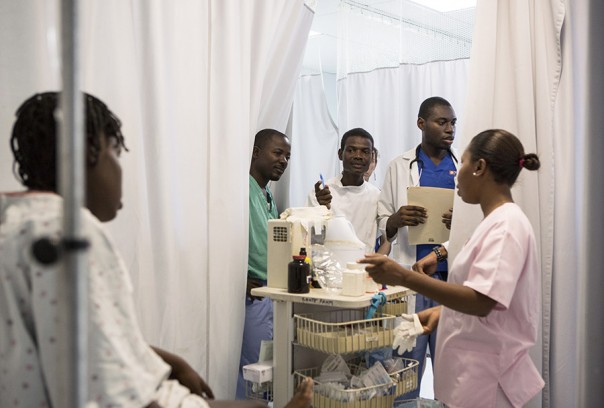
Meet our very own Haiti’s edition of Grey’s Anatomy Seattle Grace hospital residents.
The amazing young Haitian men and women OB-GYN’s in the maternity ward at University Hospital in Mirebalais, Haiti are all training to be the next generation of emergency medicine, pediatrics, surgery, and internal medicine. On average, 270 women give birth at the university which can be overwhelming for the small group of nurses and doctors, who provide 24-hour staffing to ensure the health and safety of mothers and their newborns.
Whats interesting is the four-year program focuses on both academics and hands-on experience where each residents take courses, attend lectures, and review cases every week and every morning the residents go on rounds with attending physicians to observe patients, ask questions, and provide their own real-time diagnoses. Competition for admission is fierce since thisprogram is the only one in Haiti where the administration provides food, housing, and financial support twice the amount offered by the state.
Here are the University Hospital’s first class of OB/GYN residents:
Name: Volf Ricardo Gaby
Hometown: Marchand Dessalines
Age: 27
Why did you choose to become an OB-GYN?
I knew I wanted to be an OB-GYN before I finished medical school.
My mother had three children, all by cesarean section, and during the birth of her third child, she passed away. I was in my fourth year of medical school when an organization came and did a training. It was then that I realized what had happened to my mother during her cesarean section. This made me feel compelled to become an OB-GYN to help reduce maternal mortality.
Has there been a particularly memorable patient so far?
Yes, she was in post-op when I met her. She had gone to a midwife, spent too much time in labor, and developed an infection. She lost her baby. She came to the hospital, and we treated her infection. This patient stayed in my mind, because it was my responsibility to take care of her.
Name: Jean Joel Saint Hubert
Hometown: Aquin
Age: 28
Did you always know you were going to be a doctor?
Yes, I knew since I was 16 years old. My aunt was a midwife and was always delivering babies. There was a time when she was by herself, her children weren’t there, and she called me to help with a birth. There were two people in labor, and she told me to stay in the room, watch the patient, and call her when I saw the baby’s head. I saw the head and called her, but she couldn’t come because she was with the other patient.
So I put on gloves and held the baby’s head as the baby came out. The only thing I couldn’t do was cut the cord. Ever since then, everyone—even my friends—have called me ti doktè, which is Kreyol for “Little Doctor.”
How do you like the residency program?
After the construction of the hospital, I always went and looked at PIH’s website. I saw information about the hospital and decided to go to Mirebalais because they have many programs that train Haitian doctors. I attended an orientation that detailed Zanmi Lasante’s story, and physicians talked about how we have to consider patients and give them attention. I like Zanmi Lasante’s philosophy; I’m not just a doctor, I connect with my patients.
Name: James Saint Surin
Hometown: Léogâne
Age: 29
Did you always know you wanted to be a doctor?
I had a different plan, but things changed and then I wanted to become a doctor. I went to a mobile clinic and saw that there weren’t enough doctors and medicine for the patients. That’s when I knew I wanted to be a doctor.
Why did you choose to specialize as an OB-GYN?
I was in my sixth year of medical school and was doing clinical rotations when I realized that I like OB-GYN as a specialty. Delivering babies is a good thing. You are always in contact with patients. I also like that OB-GYN has a surgical element to it in that you get to perform cesarean sections.
Rubens Ulysse (not pictured) is also among the first class of OB-GYN residents at University Hospital.
To learn more about the program and the doctors Click Here. | Story Source





























